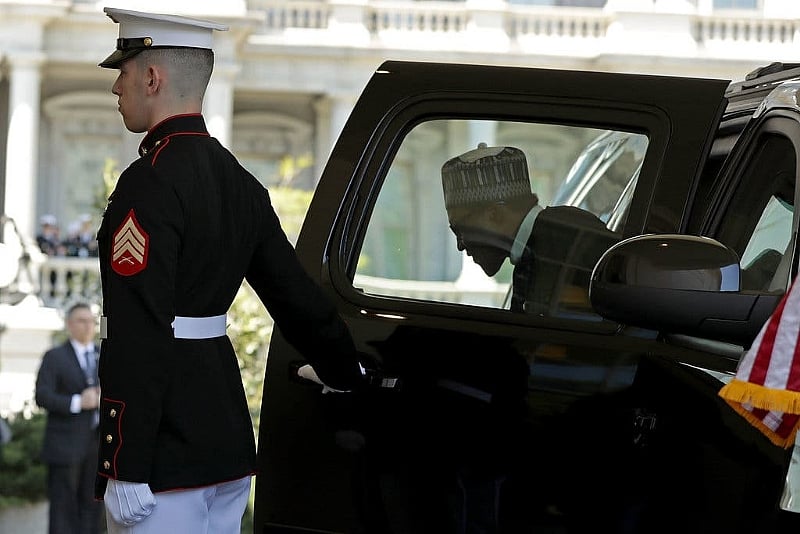In this report, ODIMEGWU ONWUMERE questions the healthcare system if they are meant for beasts, because Buhari who on assumption of office in 2015, sent a stern warning to politicians not to seek for medical help abroad but before 2022, he had spent 225 days on medical trips abroad, and visited 40 countries, spent ₦41b on presidential fleet, despite ₦2.3tn health budgets; and by 2025, he passed on in London
The weather wasn’t clement in Port Harcourt. There have been nonstop downpour for seven days. The erratic electric supply went from worse to worst. Then, the news of ex-Nigeria’s President, Maj-Gen Muhammadu Buhari’s death at 82, in a London hospital on July 13, 2025, from leukemia related issue, spurred retrospection.
“What is the illness that the President has that we don’t have the personnel or manpower in Nigeria to treat such that he has to travel out of the country?” the Nigerian Medical Association questioned earlier in the years when he started the medical journey.
Prior to August 1, 2021, the Aso Villa clinic meant as the presidential clinic that should take medical help of the President, Vice President, their families and members of staff of the Presidential Villa, in Nigeria’s seat of power, gulped N6.2bn in six years, and doctors knocked the Federal Government of Nigeria.
Buhari’s former aide while in office, Femi Adesina, issued a press briefing on November 19, 2020, pointing out the numerous healthcare projects that Buhari had commissioned. He was in Borno State in 2020 to commission hospital projects. In March 2022, he was in Makurdi to commission another healthcare centers. That of Makurdi was named after him.
He acknowledged that Nigeria was a beehive of countries with the highest mortality rates believing that the projects would reduce the malady. Despite all the funfare of commissioning hospitals in the country, the Ex-President of Nigeria, who, during his presidency from 2015-2023, was a guest in London hospitals and died in one, two years after he had left office.
Buhari spent 201 days by 2021, on foreign medical trips, despite N2.3tn health budgets. This happened within six years and two months of his then regime. An elder statesman, Chief Edwin Clark (of now blessed memory) cautioned, “Buhari can’t run Nigeria from UK.”
It was on June 6, 2016, that Buhari left for the UK for his first medical vacation. This was after there was a rumour he had ear infections. He returned on June 19, 2016. The President of Campaign for Democracy, Dr Joe Okei-Odumakin was bent on seeing the country work. She was not happy seeing the no improvement in the healthcare system by the successive governments.
According to a novelist and political columnist, Prof. Okey Ndibe on the news website Sahara Reporters, ”The best-funded clinic in Nigeria does not suffice to treat the president’s ear infection. Nor does the president have enough confidence in the same clinic to do his ‘routine checkups’ there.
“Imagine, then, the fate of Nigerians who have no choice, but must seek treatment at the ill-equipped, wretchedly funded hospitals in our country. Are these Nigerians not simply woebegone, bereft of hope?”
Our findings to this revealed that healthcare approach in Nigeria remained a concern as both internal and external factors mar the system. “Misconception of primary health care and poor leadership resulted in a stunted health system development which has failed to align system structures and processes to the goal of achieving universal health access,” said scholars whom we decided to dub anonymous given their sensitive positions in the country.
The source further pointed out that the country rarely have committed policy makers manning the three-tier healthcare system: “Primary Healthcare (PHC): Community-based health centers that offer basic medical services, vaccinations, and maternal care. Secondary Healthcare: State and general hospitals that handle more complex cases and minor surgeries.”
People we interviewed said that the country’s healthcare was fraught with obsolete medical equipments, healthcare funding was below 5% in the country’s yearly budget. This was found out to be abysmal to the 15% as approved by the African Union’s Abuja Declaration. Too many issues bedeviled the system. Amongst the challenges was the shortage of doctors and specialists who preferred migrating abroad, just like Buhari, because of the shortcomings in the country’s system.
The Nigerian Medical Association, and National Association of Resident Doctors have been worried about this development – where government officials preferred foreign hospitals to the country’s. According to a source, “Nigeria’s public health facilities are run-down and overcrowded.
“The country spends just 3.7% of its gross domestic product on health, compared with more than 17% in the U.S.,” according to the World Health Organization, “while vast amounts are siphoned off by corrupt government officials. Nigeria has only four doctors per 10,000 people.”
A scribe of the associations, Dr Philip Eke, praised the private hospitals for the unique development in the healthcare system in the country as against public owned that were marred by irregularities.
In a public presentation, he said, “We could have committed more funds to make the health sector better. But unfortunately, it is even the private sector that is improving the health sector, not the public sector, because the government is not even buying equipment.”
Buhari had sternly warned politicians not to seek medical help abroad immediately he assumed office, but was always in Britain on his medical trips.
Before 2022, he had spent 225 days on medical trips, and visited 40 countries, spent ₦41 Billion on presidential fleet despite ₦2.3tn Health Budgets.
Those who know better said that he was not left alone in the list of African leaders who disdained their countries’ hospitals (meant for beasts?) and preferred to die in a foreign one.
• Onwumere is Chairman, Advocacy Network On Religious And Cultural Coexistence (ANORACC).


